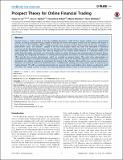Prospect Theory for Online Financial Trading
Author(s)
Liu, Yang-Yu; Nacher, Jose C.; Ochiai, Tomoshiro; Martino, Mauro; Altshuler, Yaniv
DownloadLiu-2014-Prospect theory for.pdf (1.782Mb)
PUBLISHER_CC
Publisher with Creative Commons License
Creative Commons Attribution
Terms of use
Metadata
Show full item recordAbstract
Prospect theory is widely viewed as the best available descriptive model of how people evaluate risk in experimental settings. According to prospect theory, people are typically risk-averse with respect to gains and risk-seeking with respect to losses, known as the “reflection effect”. People are much more sensitive to losses than to gains of the same magnitude, a phenomenon called “loss aversion”. Despite of the fact that prospect theory has been well developed in behavioral economics at the theoretical level, there exist very few large-scale empirical studies and most of the previous studies have been undertaken with micro-panel data. Here we analyze over 28.5 million trades made by 81.3 thousand traders of an online financial trading community over 28 months, aiming to explore the large-scale empirical aspect of prospect theory. By analyzing and comparing the behavior of winning and losing trades and traders, we find clear evidence of the reflection effect and the loss aversion phenomenon, which are essential in prospect theory. This work hence demonstrates an unprecedented large-scale empirical evidence of prospect theory, which has immediate implication in financial trading, e.g., developing new trading strategies by minimizing the impact of the reflection effect and the loss aversion phenomenon. Moreover, we introduce three novel behavioral metrics to differentiate winning and losing traders based on their historical trading behavior. This offers us potential opportunities to augment online social trading where traders are allowed to watch and follow the trading activities of others, by predicting potential winners based on their historical trading behavior.
Date issued
2014-10Department
Massachusetts Institute of Technology. Media LaboratoryJournal
PLoS ONE
Publisher
Public Library of Science
Citation
Liu, Yang-Yu, Jose C. Nacher, Tomoshiro Ochiai, Mauro Martino, and Yaniv Altshuler. “Prospect Theory for Online Financial Trading.” Edited by Tobias Preis. PLoS ONE 9, no. 10 (October 15, 2014): e109458.
Version: Final published version
ISSN
1932-6203